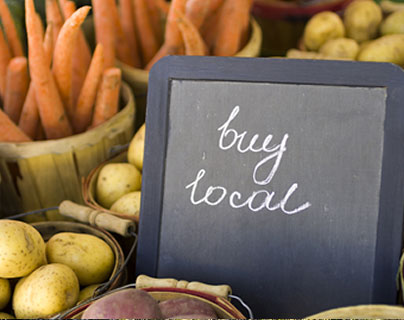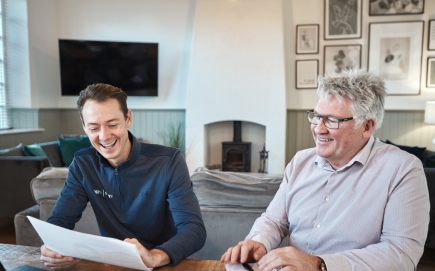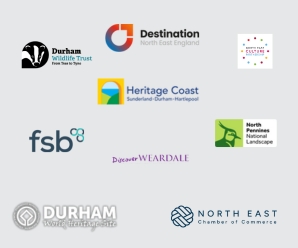Destination management organisation
Welcome to Visit County Durham - the tourism management agency for County Durham which works on behalf of businesses and public agencies to support the growth and development of the county's visitor economy.
Visit County Durham has strategic responsibility for tourism and performs the functions of destination management and marketing in the county. Many others are involved in delivering a vibrant visitor economy, one organisation cannot do it alone, which is why we are a partnership.
Our aim is to place the visitor at the heart of everything we do.


















Destination performance



17.91m
(Visitors Annually)



4.6m
(75 Attractions)



9%
(Overnight Stays)



11,724
(Jobs Within the Industry)



£1.04bn
(Annual Income)
Latest news
Raby Castle achieves Green Tourism Award
23 Apr 2024
Raby Castle has secured a significant achievement in the Green Tourism awards certification programme with a silver in recognition of the business’s commitment to sustainability. The Green Tourism awards are acknowledged worldwide as an indicator of good environmentally-friendly practice and act as a hallmark of ‘green quality’. Raby Castle submitted evidence across multiple criteria including […]
Read More about Raby Castle achieves Green Tourism AwardCrowds flock to Bishop Auckland to enjoy taste of popular food festival
22 Apr 2024
Thousands flocked to this weekend’s Bishop Auckland Food Festival, where celebrity chefs, tasty treats, and family fun were all on the menu. More than 150 stalls lined the streets, with traders from County Durham and beyond selling curries, crepes, cocktails and mocktails and more. Famous chefs including plant-based and vegan duo, BOSH!, and BBC Saturday […]
Read More about Crowds flock to Bishop Auckland to enjoy taste of popular food festivalWomen's professional cricket coming to Durham
18 Apr 2024
Following an extensive bidding process Durham Cricket have been awarded a Tier 1 professional women’s team. A restructure of the women’s professional game has seen the England and Wales Cricket Board award 8 counties with professional women’s teams. Durham will be joined by Essex, Hampshire, Lancashire, Nottingham, Surrey, Somerset and Warwickshire to form the new […]
Read More about Women's professional cricket coming to DurhamSuppliers to industry



Humble Bee
At Humble Bee we are proud to support honeybees and pollinators in the Durham area. Come and join us for our incredible Bee Experience set in 60 acres of wildflowers and get hands on with our Local Honeybees. Pick up a ‘pot of Sunshine' with our Award-winning Honey, produced just outside the city centre by […]
Read More about Humble Bee


Towergate Insurance Brokers
Towergate have been insuring businesses in the North East of England since 1973. With our expertise in the Leisure and Hospitality Sectors, we have been offering both packaged and bespoke risk management and insurance solutions to businesses of all sizes for decades. Whatever your business, it is essential to carry out a periodic review of […]
Read More about Towergate Insurance Brokers


Coghlans Artisan Bakery
Coghlans at Barningham's Artisan Bakery has been created within the old stable block and coach house at Barningham Park, a classic estate where the bakehouse and kitchen hosts a range of artisan products from bread and chocolates and your daily essential needs. Coghlans handmade bread use no preservatives food colours or artificial flavours, just a natural product from […]
Read More about Coghlans Artisan Bakery


Host & Stay Property Management
Born in 2017, we are a family-owned property management company with a desire to lead the change in an age-old industry. Founded in the family’s home region of North Yorkshire, our mission has always been to help holiday homeowners unlock the potential in their homes with new methods for new times. We’re here to change […]
Read More about Host & Stay Property ManagementVisit County Durham latest



VCD Blog - Celebrating International Women’s Day 2024
Today (Friday 8 March) is International Women’s Day, a global celebration of the social, economic, cultural and political achievements of women. It is a chance to reflect on the remarkable feats of women, past and present, while also recognising the amazing women we encounter in our own personal and professional lives. Ultimately, International Women’s Day […]
Read More about VCD Blog - Celebrating International Women’s Day 2024


VCD Blog - Working together for Durham and the North East
At Visit County Durham we are proud to be a part of a proactive network of regional partners working together to promote and develop Durham and North East England as destinations. As one of the three Local Visitor Economy Partnerships piloting England’s first Destination Development Partnership, we work closely with NewcastleGateshead Initiative and Visit Northumberland, […]
Read More about VCD Blog - Working together for Durham and the North East


A destination for all: Accessibility takes centre stage at tourism conference
Ensuring an excellent welcome for all visitors was the key theme of Visit County Durham’s 2023 Industry Conference.
Read More about A destination for all: Accessibility takes centre stage at tourism conference


Research reveals Memorable Moments marketing campaign generated millions in visitor spend
Visit County Durham’s national destination marketing campaign, Memorable Moments, generated £86.6 million in visitor spend, research has revealed.
Read More about Research reveals Memorable Moments marketing campaign generated millions in visitor spendSocial wall
Please spare 10 minutes of your time to complete our latest How's Business survey.
The results are important for us to see what is happening across the visitor economy and to analyse where there are key themes and issues. The results of the survey help form our future activity and to see ...how we can best support you as a business.
The deadline is Friday 10th May and you can launch the survey here 👇
https://tinyurl.com/3tv37fva
Our Meet in Durham website targets the business events and conference market. The website presents the county's venues, accommodation and unmissable delegate experiences through a single dedicated platform.
You can view the site here 👇
...https://www.thisisdurham.com/meet-in-durham
To get involved, email us 👉 info@meetindurham.org
Visit County Durham Partners, could your business benefit from leaflet distribution through our Visitor Information Network?
Get your literature in front of both visitors and residents alike in leaflet racks at approximately 40 key locations across the county, including attractions, ...accommodation and transport hubs.
Find out more here 👇
https://www.visitcountydurham.org/partner-marketing.../
Visit County Durham's Northern Saints Trails Passport encourages walkers to seek out locations along the Northern Saints routes to obtain stamps as a record of their visit.
Marketing activity promotes participating businesses, driving footfall to those taking part.
Get in touch to... find out more about stocking or participating in the passport here 👇
Craig.Wilson@visitcountydurham.org
This week Visit County Durham welcomed Neil Sowerby from Confidentials on a media visit, as part of the media activity for our current national destination marketing campaign - Do Durham Differently campaign.
Neil and his wife will be sampling different accommodation across the county including... Hotel Indigo Durham, Park Head Hotel and Seaham Hall, as well as exploring the Durham Heritage Coast, Durham Cathedral and The Auckland Project .
The piece in Confidentials will go live later this spring, encouraging visitors to #dodurhamdifferently as part of a getaway this year.
Confidentials is a small, independent publisher in Manchester, Liverpool and Leeds, with content covering restaurants, bars, things to do, culture, lifestyle and news. Aimed at the North West England market.
Find out more here 👇
https://confidentialguides.com/
Restoration works to "protect the future" of the popular @Killhope are taking place throughout this year, thanks to a £500,000 funding boost. This means the venue will have to remain closed for the 2024 season.
Find out more here 👇
https://tinyurl.com/yzfah4jb
Front of line staff from the destination attended the Welcome to Durham course today. The attendees found out about key customer service skills for the hospitality industry as well as an insight into the offer the county has and it’s new developments. The day ended with a tour around The ...Auckland Project’s attractions.
Great to see our partners from Durham Cathedral, Infinite Air, Honest Lawyer Hotel, Headlam Hall, Beamish Hall, South Causey Inn, Park Head Hotel, Dalton Park Outlet & Outdoors and Raby Castle join us, along with Sandy Park Camping and Brambles Coffee Shop.
Thank you to Matthew from East Durham College and Jan Williams Blue Badge Guide for delivering a brilliant session!
📣 This week's Grapevine is out now, read the latest about-
▪️ Explore our Toolkits
▪️ Investment in Peatlands
▪️ International Passenger Survey
▪️ T-Stats Reminder
Find out more here 👇
https://tinyurl.com/98xfw355






































